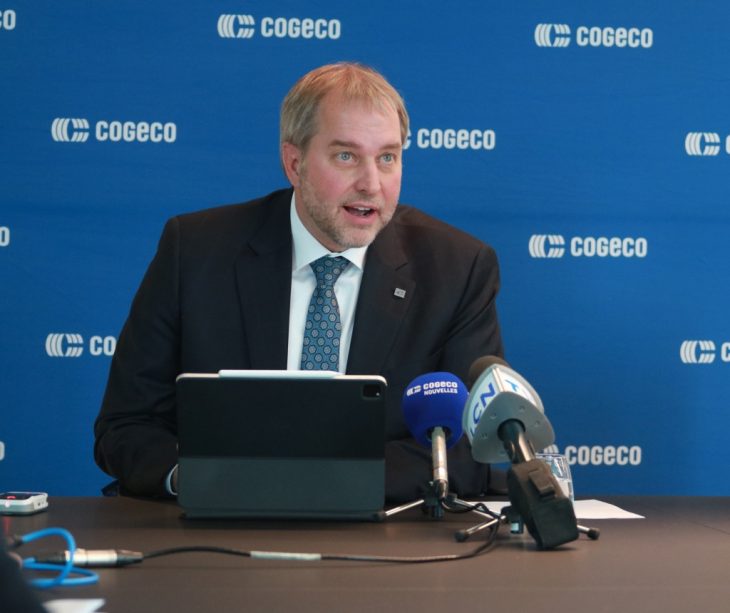
By Steve Faguy
MONTREAL — Cogeco CEO Philippe Jetté doesn’t want to discuss when he expects the company will launch a wireless service.
He was pestered with questions from journalists Thursday before the company’s annual general meeting — is it a matter of weeks, months, years? — but repeatedly said that they’re working toward a launch and would announce their plans in the near future. An actual launch is unlikely in the “short term” because “some preparation work remains,” he told analysts earlier.
Jetté expressed some frustration with the length of the process, both in terms of regulatory obligations and the slow pace of negotiations with Canada’s big three telecom providers.
“It’s easier to enter the mobile market in the U.S., because operators are inclined to negotiate with MVNO providers,” Jetté said, and Cogeco would not need to invest in its own physical wireless network as is the case in Canada.
Though he wouldn’t say if Cogeco would launch in the U.S. before it does so in Canada, he said a U.S. launch would happen soon.
Having acquired $600 million of wireless spectrum covering its entire wireline footprint in Quebec and Ontario (plus Toronto, Montreal, Ottawa and Quebec City), negotiations are the main focus now, and Jetté alleged Bell, Rogers and Telus are dragging their feet as much as they legally can.
“The government is very worried about price increases from big players,” he said, noting increases at Rogers that have some accusing the company of going back on the promises it made when it acquired Shaw. “I invite the government to put in place the right conditions” for more competition from companies like Cogeco.
Jetté also had some harsh words for the Big Three on wireline operations. Recent acquisitions of third-party internet providers including Distributel, Start.ca and EBox mean that the big three providers are now the biggest third-party users of Cogeco’s wired network.
“This situation is unacceptable,” Jetté said. “Over the years, Cogeco has invested billions of dollars in building reliable networks, and we want to continue doing so, but it is difficult to continue investing in our networks if we have to sell them at a loss to companies with capital expenditures 10-15 times greater than our own. This is particularly a problem in rural areas.”
The CRTC is holding a hearing next month on the wholesale high-speed access service framework.
“We’ll ask the CRTC to prohibit the three largest providers from accessing the wholesale system, which was never designed for them,” Jetté said.
Cogeco itself got into the game last year, acquiring Canadian third-party internet provider Oxio. Jetté said the company plans to accelerate Oxio’s growth, targeting users who want digital-only interactions with their service providers or are more price-conscious.
“We do not expect to make any major acquisitions in the near future, because our focus is on executing our other growth initiatives,” Jetté said.
Instead, the company continues to build out its wired network. It added 124,000 homes passed last year in Canada and the U.S. (where it operates as Breezeline), expanding its network by seven per cent. In the past quarter, Cogeco reported spending $30 million on network expansion.
In Ohio, Breezeline is still recovering from customer loss following the purchase of systems from WideOpenWest (WOW) in Cleveland and Columbus. “We are not losing as much customers as we were,” Jetté said, noting the “massive investments” made in Ohio to improve its service.
Those investments haven’t brought customers back yet, though. “It will take several quarters” to see a bounce back, Jetté said.
Last month, Cogeco bought back six million of its subordinate voting shares and 2.3 million shares of its subsidiary Cogeco Communications, as Rogers sold its stake in the company to the Caisse de dépôt et placement du Québec.
Cogeco described the Caisse as an “anchor investor,” which Jetté said represents a vote of confidence in its business that he hopes will send a signal to other investors.
Jetté was asked by both analysts and journalists why, amid this transaction, the company didn’t simplify its corporate structure and absorb Cogeco Communications, which is the company’s telecommunications arm, into Cogeco Inc., whose only other subsidiary is Cogeco Media and its 21 radio stations.
“The reason why we have two separate companies is for historical reasons,” Jetté told analysts. “We’re always looking at ways of improving value for shareholders, so that is an option. We’re not closed to anything, including this. But anything we do comes with pros and cons, so that’s something we’ll need to look at with the board.”
At Cogeco Media, little has changed. The company is working on launching a “multiformat broadcast studio” and major programming changes at its flagship talk station 98.5 FM in Montreal, with the coming departure of morning host Paul Arcand.
In its quarterly earnings report released Wednesday, Cogeco reported a 1.7 per cent year-over-year decline in revenue, attributed to customer loss in the United States with many consumers choosing internet-only services. Total profit was down 20 per cent mainly due to financial expenses including debt refinancing and depreciation and amortization. Net capital expenditures were down 26 per cent year-over-year, but Chief Financial Officer Patrice Ouimet said the company plans to increase capital expenditures in the current quarter.
Photo of Cogeco CEO Philippe Jette, by Steve Faguy.


